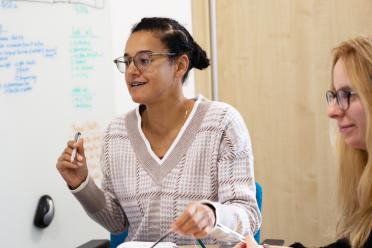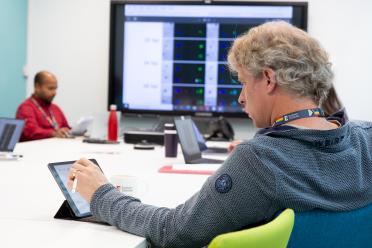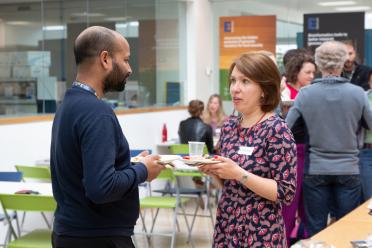Cellular Genomics: understanding why being different is normal
What does a “healthy” or “normal” cell look like?
This question might sound simple, but it is the elusive target of a hugely ambitious new research programme at the Earlham Institute.
We expect the genomes of two different species to differ significantly. It’s also understood that we’ll see smaller - yet unmistakable - variations between individuals of the same species.
But, until recently, when it came to looking at cells within a single individual, we expected a fixed genome.
For many years, most researchers accepted that all the cells in a healthy tissue were genetically the same. Under a microscope one healthy liver cell looks identical to its neighbours. When variation was reported, it was most often in the context of diseases such as cancer.
But the advent of new technology platforms has allowed us to take a much closer look at healthy organisms and tissues. This is revealing a staggering amount of diversity in molecular makeup at the cellular level.
Within a single individual, cells with the same origin and function - such as those producing our vital blood platelets or extending the roots of plants - have been shown to carry different amounts of DNA. This can vary from the textbook two copies of the genome to more than 100.
This complexity extends to the genes expressed between cells, as a direct consequence of every tissue in the body containing different populations and sub-populations of cells, including the 75 cell types found among the 86 billion cells forming our brains.
And all of this diversity is common, natural – and healthy.
The Earlham Institute’s Cellular Genomics strategic research programme builds on pioneering new approaches to single-cell genomics. These have been developed through its previous BBSRC-funded programmes and support in platform development.
Over the last few years, the Institute has developed software and laboratory protocols to examine molecular cellular identity in model systems; developed unprecedented levels of cell resolution and analysis; and characterised genes and cell-types associated with resistance to disease and climate change.
Now, researchers at the Institute are exploring the rules of life as they investigate the impact of diversity and variation in genes and their expression at the single-cell level.
Dr Wilfried Haerty, who is the Institute’s lead on the Cellular Genomics research programme, explains a major focus for this new programme is establishing a baseline of what constitutes healthy genetic variation.
He says: “We generally look at genomic variation within an individual as a result of disease. Cancer cells may develop as a consequence of a mutation causing uncontrolled proliferation, but that doesn’t take into account that diversity and mutation among cells is normal.
“This process is often part of the fundamental biology of an organism, or a natural response to environmental stimuli.
“So we know something about diseased behaviour. But studying these processes in healthy organisms could answer many questions.”
For instance, Dr Haerty says healthy megakaryocytes - the cells responsible for making our platelets - have been observed carrying 2, 4, 16, or as many as 128 copies of the genome.
“What are the implications of this? Transcription is tightly regulated in a cell - but if 128 versions of the same gene are all potentially being transcribed at the same time, how is that policed by the cell?”

It has been a lot of work to get to this point. This is the right direction for the Institute, and there is a conscious will to showcase the work we are doing here.

Dr Maria Derkacheva, Programme Manager, Cellular Genomics

Funded by the Biotechnology and Biological Sciences Research Council, part of UKRI, Cellular Genomics is a highly multidisciplinary research programme, involving infrastructure and expertise from across the Institute but also bringing on board strategic partners.
The programme lead, Dr Haerty, is focusing on data science for cellular genomics. This involves developing the data standards, infrastructure, and methods to make it easier to interpret, share, and reuse single-cell datasets.
Dr Haerty says the first steps were to create standards for properly and accurately describing data. “We find that one major difficulty in assessing data is that researchers don’t always describe it in a consistent manner,” he explains.
“There are either no agreed terms for recording the metadata around a sample, or such processes are too cumbersome for the scientists attempting to make those data publicly available.”



Pictured from left to right: Dr James Locke and Dr Ho-Wei Wu, partners on the ISP, from the Sainsbury Laboratory at the University of Cambridge. Dr Nicola Patron, Group Leader at the Earlham Institute and work package lead on Cellular Genomics. Dr Jo Dicks from the Cell Collections at UK Health and Security Agency, also partnering with us on the Cellular Genomics ISP.
Dr Conrad Nieduszynski is leading work to examine the consequences of somatic mutations on traits.
Somatic mutations in DNA occur after conception as a normal part of cell ageing and cannot be passed on to children. They sometimes lead to diseases such as cancer.
“Genomic variation within cells of the same tissues is fundamental to normal development and in reacting to the environment,” says Dr Nieduszynski.
“This single-cell perspective is absolutely crucial to unravel how somatic mutations can contribute to overall function and phenotype in an organism.”
The third key strand of activity is being led by Dr Nicola Patron. She is focusing on cell expression heterogeneity and how it changes during development or in response to environmental stress.
“We’re linking changes in the expression of individual cells to changes in the growth or health of whole organisms,” Dr Patron says. “This will help us to identify new drug targets, as well as ways to develop breeding stocks and crops for sustainable aquaculture and agriculture.
“This is a very collaborative project with huge and wide-ranging implications for health, food security, and plant breeding.”
The Earlham Institute’s collaborators on the Cellular Genomics programme will include national institute for data science and artificial intelligence the Alan Turing Institute, The Sainsbury Laboratory at the University of Cambridge, and the Culture Collections Department of the UK Health Security Agency, as well as breeding and technology leaders including WorldFish, PacBio, and Oxford Nanopore Technologies.
The Institute will be working closely with the Quadram Institute through joint appointments and a joint programme of work, and the John Innes Centre and University of East Anglia will also be collaborating.

This single-cell perspective is absolutely crucial to unravel how somatic mutations can contribute to overall function and phenotype in an organism.

Dr Conrad Nieduszynski, Group Leader



Pictured from left to right: Prof Conrad Nieduszynski, Group Leader and work package lead within the ISP. Dr Sebastian Anhert (centre of the group), partnering researcher on the ISP from the Turing Institute. Dr Maria Derkacheva, Programme Manager at the Earlham Institute for Cellular Genomics.
This programme will have far-reaching impact on a number of different fields. Cellular Genomics projects will help to develop climate- and pathogen-resilient crops and farmed animals by characterising genes partnering with these traits - often associated with specific cell-types - and collaborating with breeders to translate them into new elite strains.
Investigating the origins and consequences of somatic variation is essential to understand ageing and our related dietary studies will enable new developments and interventions, making important contributions to the understanding of healthy ageing.
We will continue to pioneer in data science and management, promoting FAIR data access principles and dissemination of data brokering tools and while establishing new protocols for data standards and data sharing.
The programme will also see the development and dissemination of new pipelines, technology, and software, as well as delivery of advanced training courses in data science and cellular genomics to the research community.
Helping our researchers are Earlham Institute support staff, working hard behind the scenes to bring the new research programme to life and make sure it achieves the maximum impact.
Dr Maria Derkacheva, Strategic Research Programme Manager for the Institute’s research faculty, has been coordinating the planning and development of the research programme since August 2020.
“We knew we wanted to build on the Institute’s previous work in the single cell space,” she says. “We started by developing ideas and the concept before moving on to the structure and the overall goal.
“It has been a lot of work to get to this point. This is the right direction for the Institute, and there is a conscious will to showcase the work we are doing here.”

This is a very collaborative project with huge and wide-ranging implications for health, food security, and plant breeding.

Dr Nicola Patron, Earlham Institute
The Cellular Genomics strategic programme is made possible thanks to the National Bioscience Research Infrastructures (NBRIs) at the Earlham Institute - the technology platforms and expertise within Transformative Genomics alongside the state-of-the-art equipment and resources in the Earlham Biofoundry.
These give Earlham Institute researchers - not to mention the wider bioscience community - affordable single-cell sequencing at the highest technical standards, as well as providing opportunities for sharing sequencing data and associated metadata.
Another valuable offering to the community comes from the diverse array of advanced scientific training courses run at the Institute, which offer invaluable skills and access to the latest tools and approaches.
Over the next five years, the Institute’s Cellular Genomics programme is set to transform understanding of what “health” and a “healthy system” really is. This far-reaching research has the potential to unlock secrets for fields of science including microbiology, plant science, and human health.
Creation of new avenues to access data and meta-data is no less impactful. The standardisation and searchability of data for biologists could open up new realms of information for scientists across the world, with the potential for collaboration on a global scale.
This ambitious programme will cement the Earlham Institute’s position at the cutting edge of single-cell developments for non-model organisms, plants, and animals. We will continue to lead the field by going beyond cell-type classification, as well as delivering novel approaches for scalable cellular functional genomics underpinned by advanced data science approaches.